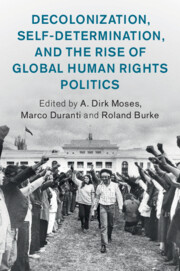Book contents
- Decolonization, Self-Determination, and the Rise of Global Human Rights Politics
- Human Rights in History
- Decolonization, Self-Determination, and the Rise of Global Human Rights Politics
- Copyright page
- Contents
- Notes on Contributors
- Acknowledgments
- Introduction
- Part I Anti-Colonial Struggles and the Right to Self-Determination
- 1 Seeking the Political Kingdom
- 2 Decolonizing the United Nations
- 3 The Limits of Humanitarianism: Decolonization, the French Red Cross, and the Algerian War
- 4 Connecting Indigenous Rights to Human Rights in the Anglo Settler States
- 5 Privileging the Cold War over Decolonization
- Part II Postcolonial Statehood and Global Human Rights Norms
- Part III Colonial and Neocolonial Responses
- Index
3 - The Limits of Humanitarianism: Decolonization, the French Red Cross, and the Algerian War
from Part I - Anti-Colonial Struggles and the Right to Self-Determination
Published online by Cambridge University Press: 24 June 2020
- Decolonization, Self-Determination, and the Rise of Global Human Rights Politics
- Human Rights in History
- Decolonization, Self-Determination, and the Rise of Global Human Rights Politics
- Copyright page
- Contents
- Notes on Contributors
- Acknowledgments
- Introduction
- Part I Anti-Colonial Struggles and the Right to Self-Determination
- 1 Seeking the Political Kingdom
- 2 Decolonizing the United Nations
- 3 The Limits of Humanitarianism: Decolonization, the French Red Cross, and the Algerian War
- 4 Connecting Indigenous Rights to Human Rights in the Anglo Settler States
- 5 Privileging the Cold War over Decolonization
- Part II Postcolonial Statehood and Global Human Rights Norms
- Part III Colonial and Neocolonial Responses
- Index
Summary
In January 1957, at the height of the Algerian War, Algerian nationalists formed the Algerian Red Crescent to provide aid and humanitarian assistance to civilians and combatants. However, the French Red Cross (CRF) had long been active in Algeria and according to International Committee of the Red Cross guidelines, individual countries are only permitted one national society. The Algerian nationalists were aware of this stipulation, yet they firmly maintained that the CRF was not neutral and actively discriminated against Algerians. This chapter examines CRF activities in Algeria during the Algerian War and analyzes how national society frequently encountered difficult situations that forced its delegates to choose between its humanitarian mission and nationalist (French) politics. More often than not the latter prevailed. Despite being a national society that was supposed to be neutral, its activities were skewed toward the French military and civilian population. The CRF had two faces: one that presented the organization as neutral, and one that prioritized the needs of French soldiers, thus violating the CRF’s core principles. This chapter highlights the intersection of politics and humanitarianism and demonstrates the persistent power of nationalism at the end of empire.
- Type
- Chapter
- Information
- Publisher: Cambridge University PressPrint publication year: 2020
- 1
- Cited by

